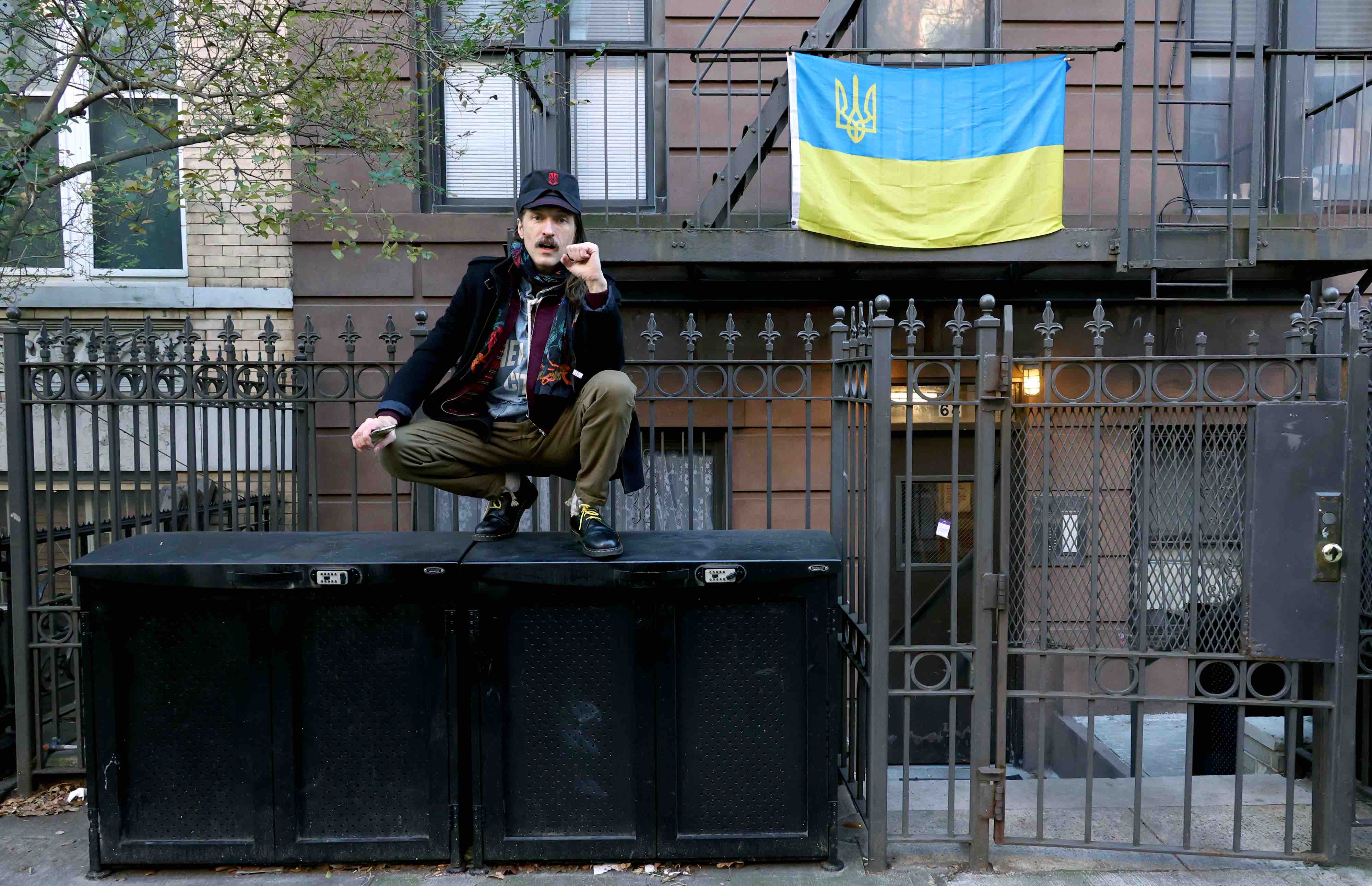Before setting out on his extensive “Perfect Day” in New York, Gogol Bordello frontman Eugene Hütz is fortifying himself with coffee, Moroccan eggs, and halloumi cheese at Café Mogador in the heart of the city’s eclectic East Village neighborhood. He started coming to this cozy, family-run restaurant in 1997, and has written many lyrics while sitting here that later ended up on his gypsy-punk band’s eight studio albums (including Solidaritine, released this past September).
Hütz is excited to get going on a fun day in the city—but first, he wants to make it clear that this will only be a temporary distraction from more serious business: as a native of Ukraine (where he lived until his mid-teens), he’s been working tirelessly to raise funds and awareness for that country’s nearly decade-long war against Russia which exploded last February with Russia’s invasion of Ukraine. “This topic is inescapable, and this year is as close as my rock-and-rolling has come to heavy responsibility and work toward a common Ukrainian goal,” Hütz says, “but that’s the only way. That’s how Ukrainian people, and people who are [allied] with Ukrainian people, are assured of this victory, is the unity. As a Ukrainian, I was definitely not going to sit there and think Russia is going to win and there’s nothing you can do.”
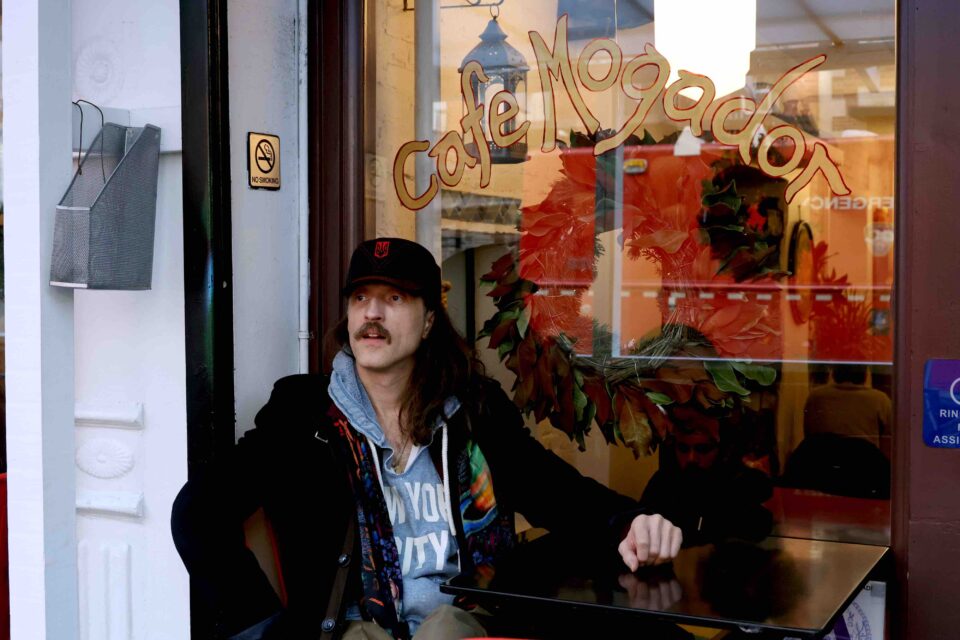
His normally exuberant attitude returns as he ventures out onto St. Mark’s Place. Since the 1990s, he’s seen gentrification push out much of the artistic community that made this area trendy in the first place—but he refuses to gripe about it. “As cliché as it sounds, all that you need is still here; it’s just a little trickier to find it,” he says. “I miss certain places, but I also know that time is bringing other things, and every time you turn a corner, something new awaits.”
He heads into Tompkins Square Park, which he says is one of his favorite spots in the city. Now filled with dog walkers and parents pushing strollers, it’s quite different from the seedy place it was when he came here for the first time a quarter century ago. He was visiting New York from Vermont, where his family had been resettled as refugees the year before. He didn’t know the city well, and ventured into the park out of curiosity where he found a free concert by now-legendary indie rock bands Congo Norvell, Firewater, and Jonathan Fire*Eater. He finds the exact spot where this happened and grins at the memory.
“I saw Ukrainian restaurants and bars, and clubs with hardcore punk and alternative music. I looked at all of that, and I said, ‘Honey, I’m home.’ I walked into my own unique best case scenario of a place.”
“I walked into a free show, met tons of people, and then walked around this area and was like, ‘Wow.’ I saw Ukrainian restaurants and bars, and clubs with hardcore punk and alternative music. I looked at all of that, and I said, ‘Honey, I’m home.’ I walked into my own unique best case scenario of a place,” he says. He moved to New York soon after, forming Gogol Bordello with other immigrants in 1999.
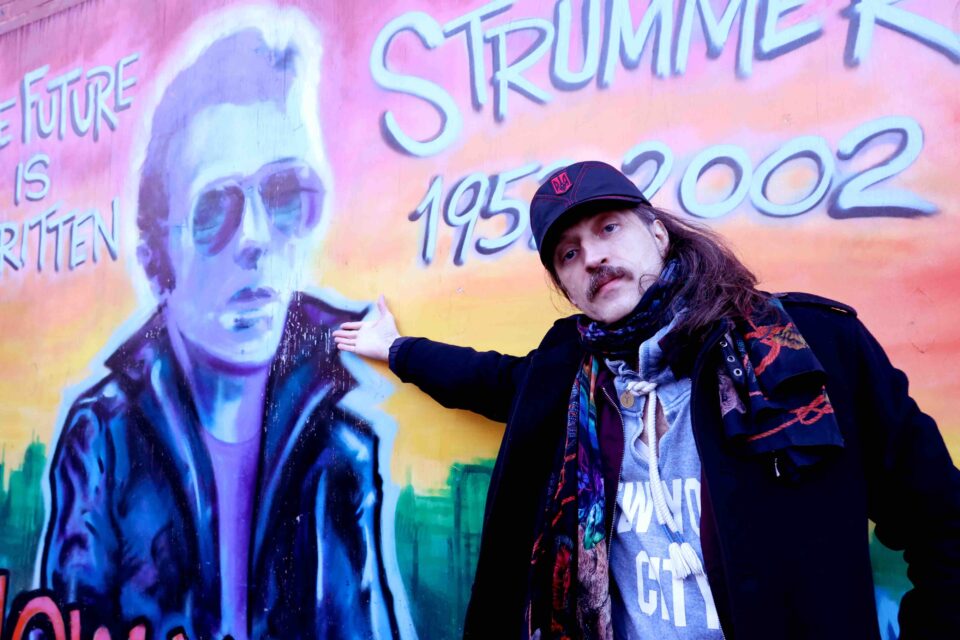
Across the street from the park, Hütz examines a famous mural of The Clash’s Joe Strummer that’s painted on the side of Niagara NYC. For years, Niagara has been one of Hütz’s favorite hangouts, along with the nearby music venue Bowery Electric.
Walking west on 7th Street, Hütz leads the way through the part of the East Village that’s traditionally been known as “Little Ukraine.” Many businesses fly that country’s flag to show support in the war effort. He pops into one of the best-known Ukrainian restaurants in this area, Veselka, where the waitstaff know him by name. “Borscht, cabbage rolls, pierogies—all the legendary stuff you’ve heard about, they’ve got it,” he says. “It’s the best unpretentious comfort food ever—it’s totally fucking yumski.”
“Borscht, cabbage rolls, pierogies—all the legendary stuff you’ve heard about, [Veselka has] it. It’s the best unpretentious comfort food ever—it’s totally fucking yumski.”
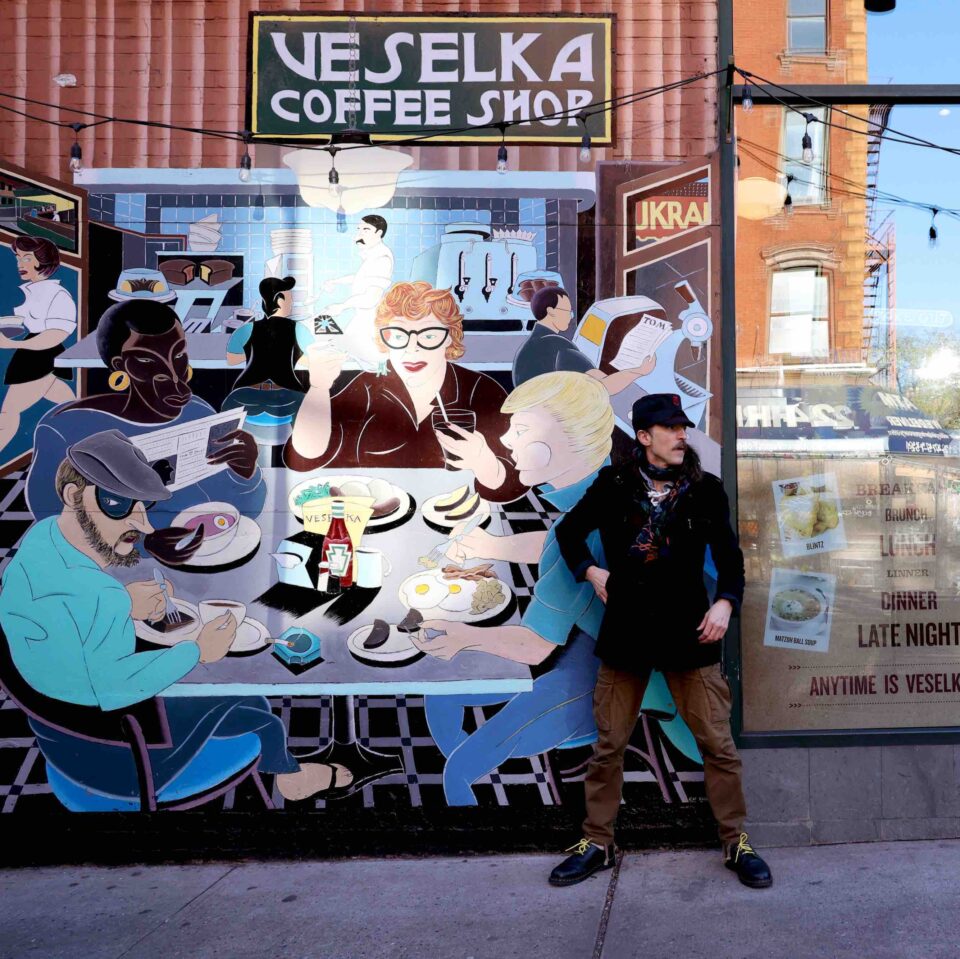
As a longtime New Yorker—and as one of the most famous Ukrainian musicians in the world—Hütz attracts a lot of attention, and constantly encounters people he knows. As he’s engrossed with talking to a friend, he doesn’t notice a fan who stops in her tracks at the sight of him. “Oh my God, it’s him,” she says, whipping out her phone and snapping some surreptitious photos before she scoots away, beaming.
After a quick ride into the central part of Greenwich Village, Hütz heads into Generation Records, another place where he and the staff know each other by name. “It’s one of the survivors,” he says of this store. “They have the aesthetic down, which is very punk-hardcore. It’s very well-researched and maintained.” He heads to the basement and flips through the 7-inch vinyl stacks, then buys a copy of Sunday Matinee, punk-turned-actress Brooke Smith’s photo diary of the Lower East Side’s nascent hardcore scene.
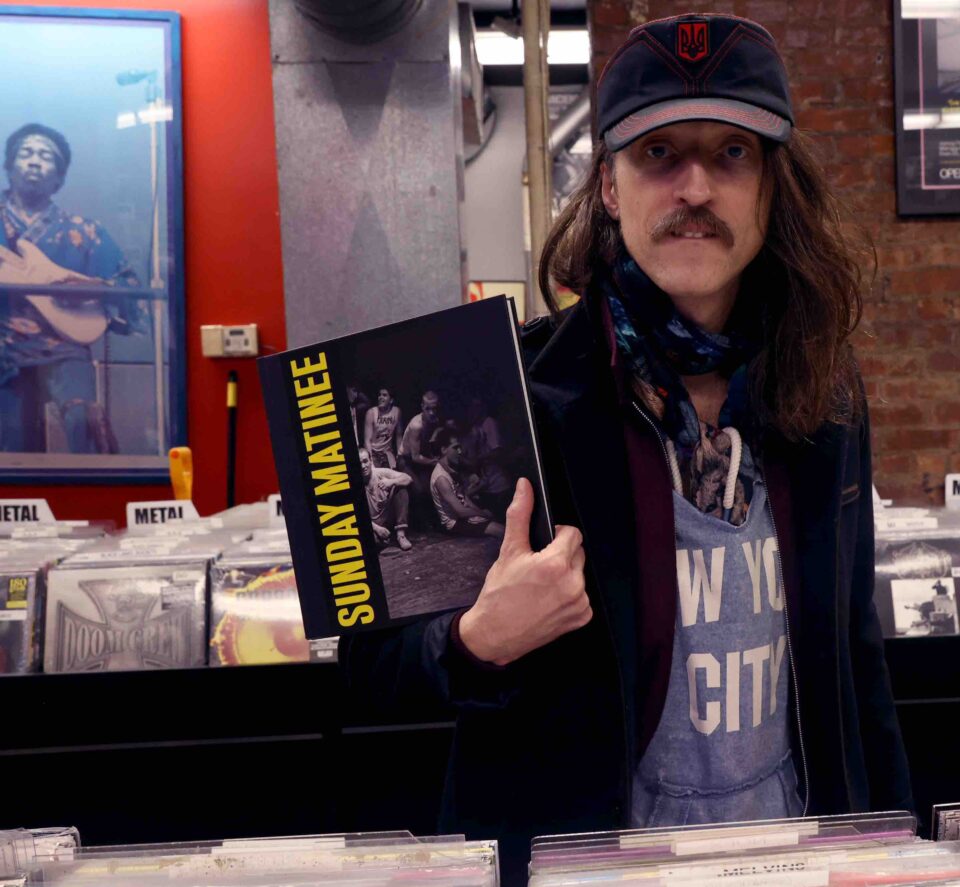
“[Generation Records has] the aesthetic down, which is very punk-hardcore. It’s very well-researched and maintained.”
Hütz opts for an early dinner a couple of blocks away at Organic Grill. (The vegetarian restaurant originally opened in 2000 further east in the Village, but relocated here a few months ago.) Hutz and the owner, Vlad—a fellow native Ukrainian—are clearly friends, greeting each other with a hug.
“This is exceptional,” Hütz says, digging into a meatless burger, sweet and sour cauliflower, and a bottle of Malbec. “This place takes vegetarian food to the level of state of the art.” Though he adds that he’s actually not a vegetarian, “I’ll literally wake up in the morning and crave it, it’s that fuckin’ good. It’s a well-known place where a lot of musicians go to eat, and it’s one of the [Ukrainian] community centers. The new location is right across from IFC Center, which is great if you have writer’s block or just want to see a good art film.”
“I thought that that was our last time there, ever—things were flying everywhere. No furniture was left untouched. But the owner said, ‘So, you want to do this here every Thursday?’”
Another quick trip brings Hütz back to where his music career really took off: Mehanata Bulgarian Bar, deep in the Lower East Side. Hütz first stumbled upon this place by accident when he was looking to support himself by working as a DJ in the late ’90s. “The kind of music I was DJing—mixing techno and punk and flamenco and Balkan music—quickly got me pretty much banned from all the bars in the Lower East Side,” he says, “so I started looking for a different place where that kind of night can take place, and Mehanata popped up on the horizon. It was a weird place. It was a Bulgarian social club. So I thought, ‘Bulgarian people, Ukrainian people, we share the [Cyrillic] alphabet; there must be more that we can share.’”
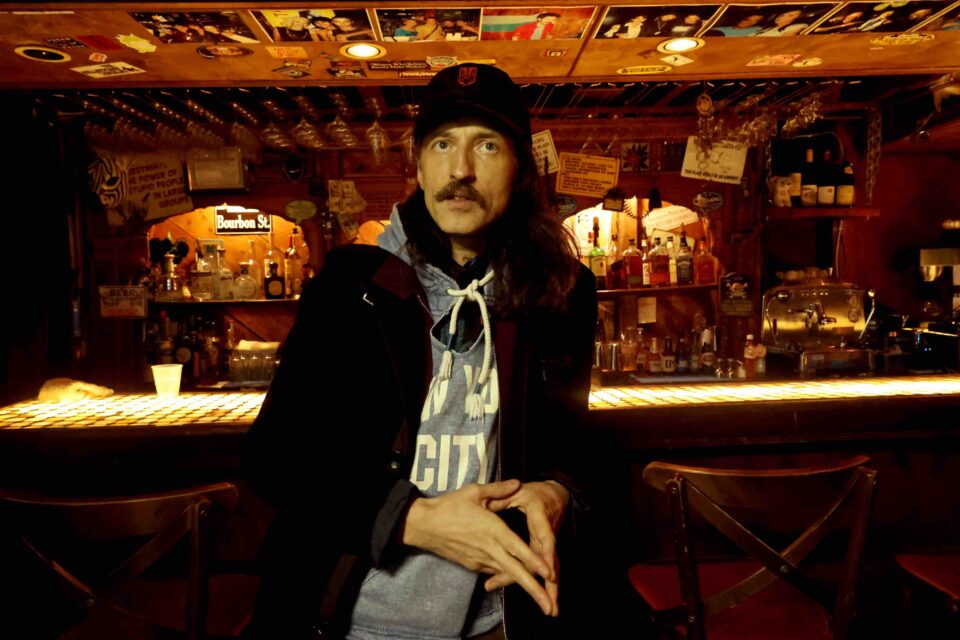
In 1999, Hütz convinced Mehanata’s owner to let him throw his birthday party there, and it quickly descended into chaos. “I thought that that was our last time there, ever—things were flying everywhere. No furniture was left untouched. But the owner said, ‘So, you want to do this here every Thursday?’”
After that, Hütz and his newly formed Gogol Bordello became the bar’s house band. It was the launch pad they needed to bring their unique, cathartic gypsy punk to the masses. “It was a group of immigrants trying to heal their scars, essentially, with music,” he says. “Mehanata was a very important place for Eastern European and Latin American immigrants to mingle together and create a new scene. Later on, the hipsterdom catches on with that. Everybody and their mother had to be there.” He didn’t mind when strangers began crashing the party: “We were charging the celebrities $200 to get in; we were making bank,” he says with a laugh.
“The vibe will transform, but it will revolve around the synergy of the city.”
Walking inside, he chats with the staff—this is yet another place where he’s well-known and loved. Settling in at the bar, he orders a Jameson, neat. Taped to the ceiling above him, dozens of photos document Menahata’s history, and he points out a shot of himself (next to a shot of soon-to-be Everything Is Illuminated co-star Elijah Wood) that he estimates was taken in 2001. He says he still visits this place all the time—he was just here the week before, in fact. Still, he says he doesn’t spend much time thinking about those happy memories.
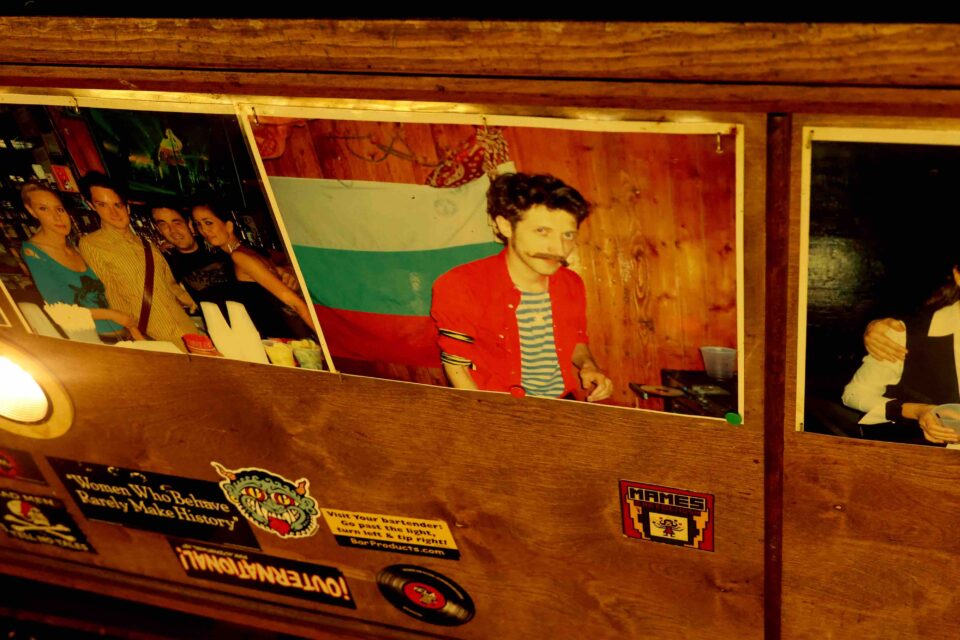
“I’m not a very nostalgic person,” he says. “I’m not like, ‘Oh my God, those great old days.’ Those days are now. It’s like, when things that become legendary in the future are happening, nobody thinks of them as legendary, it’s just an event that’s taking place. I always prefer looking at it that way because that’s just the way life is. There is a place for that, but you can’t let nostalgia hold you down. The world is designed by higher forces so that it’s constantly rejuvenating itself.” He feels that New York City, overall, is a good example of this. “The vibe will transform, but it will revolve around the synergy of the city.”
He’s tried living elsewhere—including a seven-year stint in Brazil—but this city always draws him back, and now he believes he’s here to stay. “Cumulatively, I spent most of my life in New York City,” he says. “It’s not for everybody. But those who love it, love it. When you really have that feeling, you feel that there’s a certain mystical connection. There’s something that tells me that this is a place I was always supposed to be.” FL

